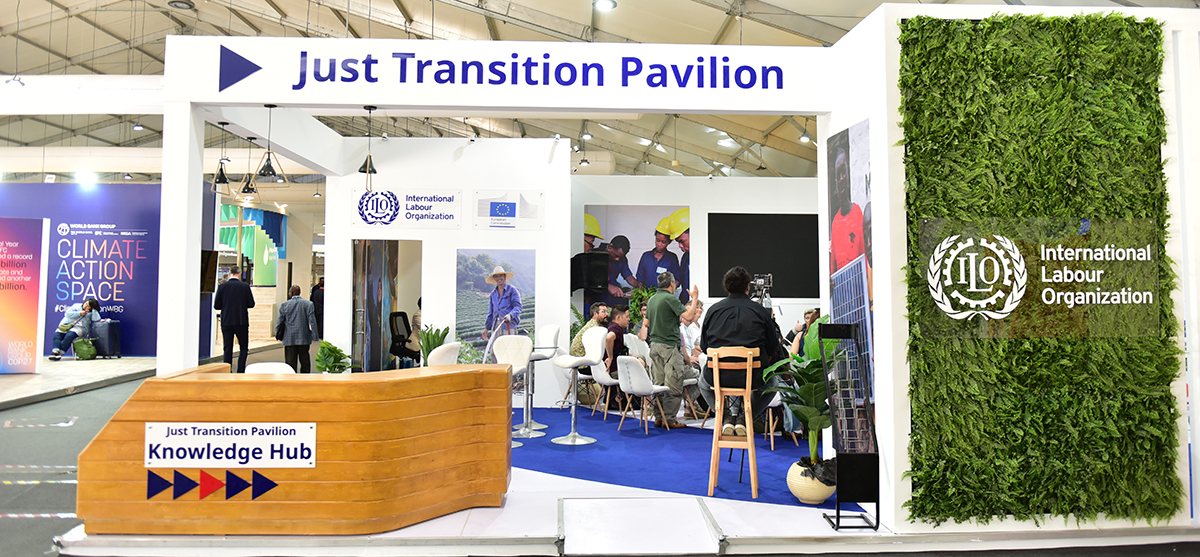COP27

@ILO Just Transition Pavilion events are livestreamed via ILO Live - COP27: Events at the Just Transition Pavilion. 
Side Event "Making the Transition Just: Protecting people, enabling participation through social protection"
On 16 November 2022, Solutions Day at the COP27 Just Transition Pavilion, a panel discussion on social protection for a just transition will take place from 13:30-14:30, organized with the support of the inter-agency Social Protection and Climate Change Working Group of the Universal Social Protection 2030 Initiative.
The transition to an environmentally sustainable economy and society will have significant implications for large parts of the population. Climate policies will only be implemented and sustained if social protection can support people throughout, protecting from adverse social and economic impacts while also incentivizing sustainable and green investments and decisions. The Paris Agreement recognizes the need to address such effects so that no one is left behind in the fight against climate change, noting “the imperatives of a just transition of the workforce and the creation of decent work and quality jobs in accordance with nationally defined development priorities”. Social protection is a key instrument in supporting both climate change adaptation and climate change mitigation policies – facilitating a transition that is just. Such a just transition, inclusive and fair for everyone, requires ensuring people’s income security, affordability of food, housing, energy, transportation, health and wellbeing, skills development and employment opportunities.
This side event “Making the Transition Just: Protecting people, enabling participation through social protection” therefore aims to highlight why and how to achieve social objectives and enable everyone to contribute to and benefit from the transition to a sustainable economy and society – including ensuring adequate social protection against risks and impacts from the transition and climate change.
The panel discussion aims to explore the following main guiding questions:
- What are the key instruments linking social protection, skills and employment to support people throughout the transition and leave no one behind?
- What research and initiatives are already ongoing in this area? What are the lessons?
- How to strategically use social protection instruments for NDC progress and discuss concrete policy proposals – to ensure the transition will be just.
The panel discussion will bring together the following high-level speakers:
- Mr. Pekka Kosonen, Finland's Ambassador to Egypt, on behalf of the Minister of Social Affairs and Health, Finland
- Dr. Maarten van Aalst, Director of the Red Cross Red Crescent Climate Centre and Coordinating Lead Author for the Intergovernmental Panel on Climate Change (IPCC)
- Dr. Mariya Aleksandrova, Environmental Governance and Transformation to Sustainability Programme, German Institute of Development and Sustainability (IDOS)
- Mr. Guy Sidos, CEO of VICAT, Chairman of the Ecological Transition Commission, Movement of the Enterprises of France (MEDEF)
- Mr. Bert de Wel, Climate Policy Officer, Trade Union Focal Point at UNFCCC and UNEPR, International Trade Union Confederation (ITUC)
- Moderation: Marie-Christina Dankmeyer, ILO’s Social Protection and Climate Change Specialist
Two publications will be launched on 16 November just before and after the panel discussion:
- The Policy Brief on Social Protection for a Just Transition (International Labour Organization) and
- Study on “The Role of Social Protection for a Just Transition in Developing and Emerging Economies” conducted by Southern African Social Policy Research Insights (SASPRI) within a GIZ-commissioned project on behalf of the German Federal Ministry for Economic Cooperation and Development.
Further updates regarding the event and the role of social protection in supporting climate change adaptation, mitigation and a just transition will also be posted through the online community platform of the Social Protection and Climate Change Working Group.